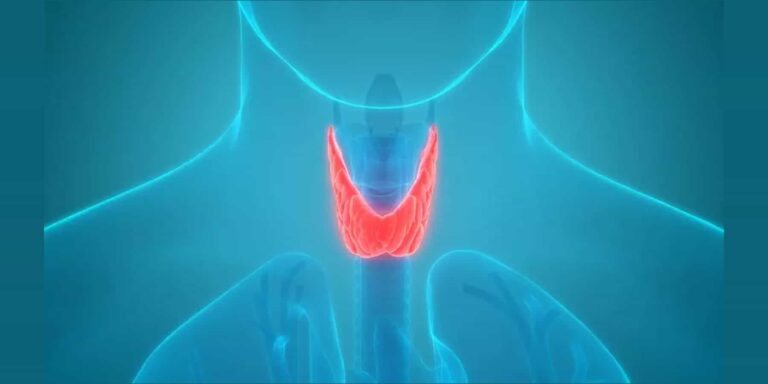Your thyroid is a butterfly–shaped gland that is located in the front of the neck below your Adam’s apple and is wrapped around the trachea (the windpipe).
An overactive thyroid (hyperthyroidism) makes you sweat more, feel hot, lose weight, or makes your heart beat faster. An underactive thyroid (hypothyroidism) does the opposite. You might feel cold, gain weight, and get a slower heartbeat. But there are other less obvious signs that you need to learn about.
The thyroid gland produces hormones, specifically monoiodothyronine (T1), diiodothyronine (T2), triiodothyronine (T3), thyroxine (T4) and reverse triiodothyronine (rT3), which regulate the energy level, growth, and reproduction of every cell in our bodies. T3 is the most active thyroid hormone, about four to five times the potency of T4, but is only called upon when the body needs it. As a result, most thyroid hormone is stored in the body as T4 which is then converted to T3 when the need arises. When there is insufficient production of T4 and/or T3 the most common of thyroid diseases is Hypothyroidism and accounts for about 80% of thyroid dysfunctions.
An overactive thyroid (hyperthyroidism) makes you sweat more, feel hot, lose weight, or makes your heart beat faster. An underactive thyroid (hypothyroidism) does the opposite. You might feel cold, gain weight, and get a slower heartbeat. But there are other less obvious signs:
Foggy Brain
Your thyroid gland sends certain hormones to your brain to help it do all its many jobs. When hypothyroidism slows down the stream of those hormones, one side effect is “brain fog.” You may find it hard to focus, remember things, or think clearly.
Mood Changes
Are you feeling sad and uneasy? There could be lots of reasons for it, but thyroid trouble is on the list. Depression is often the first sign of a thyroid problem. Anxiety is also linked to it. It’s more common to feel depressed when you have hypothyroidism. Anxiety is common with hyperthyroidism.
Infertility
Studies show that if you have an untreated thyroid disorder, you’re more likely to have complications when you’re pregnant, such as a condition called preeclampsia. You also have greater chances of a miscarriage or stillbirth. You could give birth prematurely or have a low-birth-weight baby.
Irregular Menstrual Cycle
Menstruation trouble can be a sign of a thyroid condition. Periods that are very light, very heavy, or irregular can all be symptoms. If you have no period at all, that can also be a sign. Girls with thyroid disorders may get their first period very early or very late.
Puffy Face
Does your face look doughy or swollen? It could be extra fluid your body is hanging onto because your thyroid isn’t working right. You’ll usually notice it most in your eyelids, lips, and tongue.
Blurred Vision
Sometimes a thyroid condition causes extra fluid to build up in tissues around your eyes. When that happens, thyroid eye disease can make the muscles that control your eyes get bigger. You might find you have trouble focusing or your vision may be blurry. You could also have double vision.
Carpal Tunnel Syndrome
The extra fluid shows up in other places in your body, too. The nerves that go to your hands travel through a tunnel of soft tissue near your wrist. When that tissue swells from too much fluid, it can put pressure on the nerves there. The numbness, tingling, and weakness that you get in your fingers is called carpal tunnel syndrome.
Changes in Taste
You taste with both your mouth and your brain. When your thyroid isn’t acting the way it should, it can mess with one or both of these parts of the tasting process. That can make foods taste different to you.
Low libido
When your thyroid slows down, so does your metabolism. Your metabolism controls organs in your body that put out sex hormones. When you’re low on these hormones, your sex drive takes a hit.
Hair loss
It’s normal to lose some hair every day. But if you’re starting to notice your scalp more or see changes in the overall thickness of your hair, your thyroid could be the reason. Usually, this is a problem only for severe thyroid disorders that you’ve had for a long time.
High Blood Pressure
An underactive thyroid can cause your blood vessels to become less flexible, which makes it harder for your heart to move blood to all the parts of your body. An overactive thyroid can increase blood pressure and make your heart beat faster
Additional classic signs include:
- Dry Skin and Brittle Fingernails
- Muscle and Joint Pain
- High Cholesterol
- Fluid Retention
- Headaches
- Insomnia or fatigue
Thyroid Medication
The most commonly prescribed thyroid hormone is levothyroxine (Synthroid or Eltroxin) which is T4. It is available in many strengths which makes for easier dose adjustments, but a person could be low in liothyronine (T3) as well. Unfortunately, it only comes in two commercially available strengths, 5 and 25 mcg in a product called Cytomel. Another product that contains T4, T3, T2, and T1 is desiccated thyroid (made from the bovine thyroid gland) which comes in 30mg, 60mg, and 125mg strengths.
Sometimes a patient needs more than just T4 alone and taking T3 in either 5mcg or 25 mcg is not the answer. That is where we can help. As a compounding pharmacy specializing in thyroid preparations, we have pharmaceutical-grade T3 and T4 desiccated thyroid powder. This allows us to tailor the dose to the patient’s specific needs.
If you have questions about personalized thyroid medication speak with one of our pharmacists.





